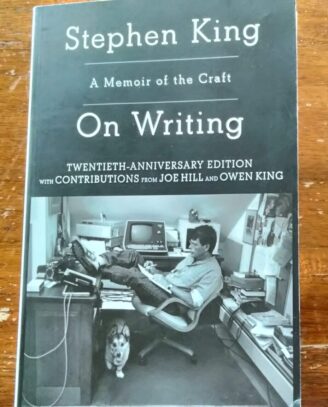How Stephen King’s On Writing Can Help You Crank Out a Book (Review #5)

On Writing: A Memoir of the Craft. By Stephen King. Scribner, 2000. Twentieth-anniversary edition. 316 pages.
Score out of 100: 92
Many people consider us writers pretentious know-it-alls. With this in mind, you might think bookshelves are buckling under the weight of memoirs of the literary craft. What the hell else would writers write about?! The bastards are a bunch of navel gazers!
In fact, the number of writing-as-a-craft memoirs is small. The nonfiction author James B. Stewart in Follow the Story and historian Robert Caro in Working each have written a book. The novelists Mario Vargas Llosa and Stephen King have too. That’s about it, though.
To be sure, nonfiction legends Gay Talese and the late Tom Wolfe have discussed the writing craft at length and Mr. Wolfe wrote a popular essay on literary non-fiction techniques. Yet Mr. Wolfe wrote no nuts-and-bolts books about the craft and Mr. Talese has not either.
Mr. King’s On Writing stands out not only because he is a famous author but also because his book articulated a philosophy of craft. As he wrote,
I don’t believe writers can be made, either by circumstances or by self-will (although I did believe those things once). The equipment comes with the original package. Yet it is by no means unusual equipment; I believe large numbers of people have at least some talent as writers and storytellers, and that those talents can be strengthened and sharpened. If I didn’t believe that, writing a book like this would be a waste of time.
As the passage suggests, On Writing offers more than A Few Insights from the Great Man in the manner of Mr. Caro’s Working. Mr. King’s book is thoughtful and wide-ranging. He discusses research, description, narration, plot, schedule, drafting and revising. It even provides nine pages of books he has read.
On Writing includes a seven-page example of Mr. King revising a short story. That helped sell me on the book. While browsing the book at a local bookstore, I thought if Mr. King went to the trouble of showing readers an example of revising his own words, the book must be decent.
One critic dismissed On Writing’s literary tips as trite. I agree some are less than earth-shattering: Work hard at writing. Close your office door when you write. Recognize ideas; you don’t find them. All writers get criticized. A good theme has focus and unity. Good symbolism enriches and adorns prose.
You don’t need Stephen King for those tips; you can find them in high school and collegiate textbooks. Yet many of the book’s writing tips are rare and valuable. Here were five of my favorites:
#1. There are four types of writers: the great, the really good, the competent, and the bad.
Mr. King asserts the following: Great writers are born. Bad writers can’t become competent ones. Yet competent writers can become really good ones. You must work hard and be smart.
This tip rings true to me. Even an outstanding writer like George Orwell complained about producing hack work.
I have written more than my share of amateurish stories. Yet I am proud of many of my stories. What made the essays, reviews, and stories strong was I followed the writing process to a tee: thorough research, a strong outline, a decent first draft, and a comprehensive second draft. Following the proper steps was as important as inspiration.
#2. To become a really good writer, you must read and write a lot.
This advice sounds hackneyed, but it is not, or in my experience anyway.
Perhaps my favorite high school English teacher said the best writers in her class were the best readers. She didn’t add that the best writers wrote a lot. Incomplete though her observation was, she gave me better general advice than any college professor or professional editor. Sometimes restating the obvious is essential, and this fits the bill for Mr. King’s advice.
Like many skills, reading and writing require pattern recognition. Spot the pattern and you can figure it out and replicate it.
#3 Pursue the story.
Mr. King argues readers want a juicy story more than flowery prose or riveting narration.
To be sure, this might sound self-serving coming from the author of books or short stories that became movies like “Carrie,” “The Shining,” “Stand By Me,” “The Green Mile,” and “The Shawshank Redemption.” His books have made him a multi-millionaire! Of course, he says to pursue the story.
To be sure, a great story alone does not equal literary greatness; if it were, The Great Gatsby, a novel of ideas and prose if there was one, would not be considered a classic.
Yet Mr. King’s advice is sound. A typical reader wants to be transported to other worlds, to partake in action and adventure, to live a little. Unless the quality of the prose is Fitzgeraldesque, he needs a story or tale.
#4 Honesty is the best policy for your readers.
Mr. King believes the bond between writer and reader is sacrosanct. To support his argument, he cites the early 20th-century writer Theodore Dreiser. Does anyone read An American Tragedy or Sister Carrie for his pretty pose? No. They read him because of his insights and brutal honesty.
#5 Second drafts equal a first draft minus 10 percent.
I like this advice not because I follow it. I wish I did! I like it because it’s a rule of thumb. Your second (and third) drafts should be like your first draft. Later drafts are for trimming rather than wholesale revision.
On Writing is not only practical but also inspiring. Mr. King comes across as a slightly profane but a also witty and astute family man. Even so, his literary output, by any yardstick, is astounding. He has written more than 60 novels and 200 short stories.
Fans of Mr. King may savor the book because of its autobiographical material: he and his brother were raised by a working-class, single mom; he is Christian but doesn’t go to church; he was nearly killed by an errant driver in 1999, etc. Yet writerly types should feel grateful a writer of Mr. King’s caliber has revealed secrets of his craft.
-30-

0 Comments